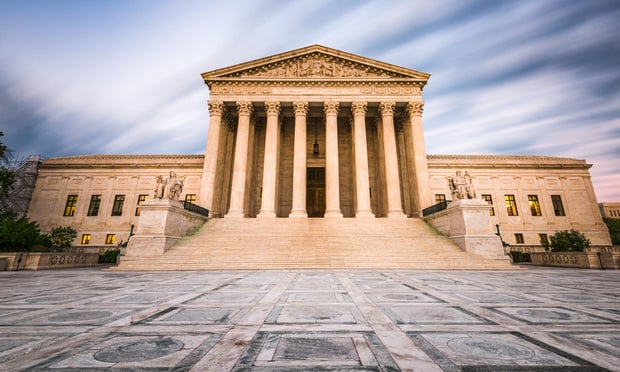Challenging the Fundamentals of Administrative Review in the Patent System
Just because many do not like the cost and lack of certainty associated with patent litigation, that doesn't necessarily give Congress the ability to address the problem by removing the decision of patent validity from the federal courts.
January 08, 2018 at 12:05 AM
6 minute read


Two recently argued Supreme Court cases that challenged the Leahy-Smith America Invents Act (AIA) may frustrate the entire administrative review system. In 2012, the AIA relieved some of the heavy cost associated with patent litigation by instituting a new, faster and less expensive way to challenge patents in the United States. The new system provided an administrative review by the US Patent and Trademark Office (USPTO) and quickly became the central, nonjudicial manner of reviewing the validity of a patent. Thousands have filed these administrative challenges, most in inter partes reviews (IPR), since the institution of the AIA.
In November, oral arguments were heard in Oil States Energy Services v. Greene's Energy Group, and Statistical Analysis System (SAS) Institute v. Lee, both challenging fundamentals of the AIA's administrative review system. While the SAS case challenges how the agency carries out these proceedings, the Oil States case questions the agency's constitutional right to conduct these proceedings.
In the current administrative review process, the USPTO conducts patent challenges in two stages. In the first stage, someone dissatisfied with the grant of a patent files a petition requesting the USPTO to institute a review proceeding. After affording the patent owner a chance to respond, the USPTO determines if it will institute the proceeding. If the proceeding is not instituted, the USPTO's decision may not be appealed and is tantamount to the patent being confirmed valid. The USPTO institutes the proceeding if they believe that one or more of the patent claims are deficient. Upon institution, in the second stage, a mini-trial is conducted before the agency to determine the validity of the patent claims.
In practice, the USPTO often institutes IPRs on only a portion of what was challenged. A mini-trial is conducted on only the instituted issues, and a written decision is provided only for the issued tried. Either the patent owner or the challenger may appeal the USPTOs decision to the Federal Circuit, but only as to the issues in the written decision.
SAS doesn't challenge the USPTO's right of partial institution of these proceedings or their right to limit the issues during the mini-trial. It takes the position that the USPTO is required by statute to address all of the challenged claims in a final written decision, de facto raising the right of appeal in relation to the claims that the USPTO left out of the institution.
SAS cites 35 U.S.C. §318(a) as the relevant statute regarding the agency's responsibility to address every claim challenged by a petitioner under the terms of the AIA. This statute reads, “If an inter partes review is instituted and not dismissed under this chapter, the Patent Trial and Appeal Board shall issue a final written decision with respect to the patentability of any patent claim challenged by the petitioner and any new claim added under section 316(d).”
SAS contends that, while the USPTO has the right to decide which issues to try, it is required by statute to address all challenged claims in the written decision. Presently, after this proceeding is complete, there are often claims and issues that were never addressed by the agency that could, and do, end up in the courts. This was never intended by the AIA.
Oil States addresses the more fundamental question of the constitutionality of these proceedings. Oil States argues that IPRs run afoul of the Constitution's guarantee to a jury trial under the Seventh Amendment. Specifically, the invalidation of a patent constitutes taking of a property right by the government and thus is subject to the protections of the Seventh Amendment. Oil States argues that Congress went beyond their authority when they allowed patent challenges to occur outside an Article III forum, without a jury.
Given the popularity of these proceedings and the frequency with which they are used, the Supreme Court's decision will have wide economic implications.
The government argues that patents are a product of administrative action and therefore a public right, not a private right. Further, there is a long tradition of administrative review in the USPTO that existed long before IPR proceedings were introduced. The IPR proceeding, while more like a minitrial than prior administrative reviews, results in the same potential for loss of patent rights. The USPTO sees these proceedings as merely taking corrective action on instruments that they previously issued.
To illustrate the enormity of this pending decision, 657 new IPR proceedings were filed with the USPTO this year and more than 100 companies and academics weighed in with the filing of almost 60 amici briefs. The Supreme Court's decision will have serious commercial impact as companies use these proceedings to reduce the cost and uncertainty associated with patent litigation.
Therein lies an important issue; just because many do not like the cost and lack of certainty associated with patent litigation, that doesn't necessarily give Congress the ability to address the problem by removing the decision of patent validity from the federal courts.
Most of the amici briefs support one side or the other, but a few support neither party. The theme is generally related to separation of powers, if patents are “public” or “private” rights or the impact that these proceedings have already had to date.
Regardless of where the Supreme Court comes out, their decision will have a fundamental economic impact on inventors, innovation and corporate development.
Lori Johnson, a shareholder in the Atlanta office of Chamberlain Hrdlicka, focuses her practice on intellectual property and strategic counseling. With more than 25 years of experience in the areas of portfolio establishment and landscape analysis, due diligence, freedom to operate, new product launch and prelitigation analysis, she helps companies understand the legal and commercial significance of their intellectual property and assists in aligning their IP portfolios to meet their business objectives.
This content has been archived. It is available through our partners, LexisNexis® and Bloomberg Law.
To view this content, please continue to their sites.
Not a Lexis Subscriber?
Subscribe Now
Not a Bloomberg Law Subscriber?
Subscribe Now
NOT FOR REPRINT
© 2025 ALM Global, LLC, All Rights Reserved. Request academic re-use from www.copyright.com. All other uses, submit a request to [email protected]. For more information visit Asset & Logo Licensing.
You Might Like
View All
Ga. Appellate Judges Mull Landlord Responsibility in Premises Liability Case Involving Child Shooting

Corporate Lawyer Accused of Extortion Pushes Back Against $3.7M Judgment
6 minute read

MetLife Attorney's Switch to Nelson Mullins Continues String of In-House Moves to Law Firms
3 minute readTrending Stories
- 1How Some Elite Law Firms Are Growing Equity Partner Ranks Faster Than Others
- 2Fried Frank Partner Leaves for Paul Hastings to Start Tech Transactions Practice
- 3Stradley Ronon Welcomes Insurance Team From Mintz
- 4Weil Adds Acting Director of SEC Enforcement, Continuing Government Hiring Streak
- 5Monday Newspaper
Who Got The Work
J. Brugh Lower of Gibbons has entered an appearance for industrial equipment supplier Devco Corporation in a pending trademark infringement lawsuit. The suit, accusing the defendant of selling knock-off Graco products, was filed Dec. 18 in New Jersey District Court by Rivkin Radler on behalf of Graco Inc. and Graco Minnesota. The case, assigned to U.S. District Judge Zahid N. Quraishi, is 3:24-cv-11294, Graco Inc. et al v. Devco Corporation.
Who Got The Work
Rebecca Maller-Stein and Kent A. Yalowitz of Arnold & Porter Kaye Scholer have entered their appearances for Hanaco Venture Capital and its executives, Lior Prosor and David Frankel, in a pending securities lawsuit. The action, filed on Dec. 24 in New York Southern District Court by Zell, Aron & Co. on behalf of Goldeneye Advisors, accuses the defendants of negligently and fraudulently managing the plaintiff's $1 million investment. The case, assigned to U.S. District Judge Vernon S. Broderick, is 1:24-cv-09918, Goldeneye Advisors, LLC v. Hanaco Venture Capital, Ltd. et al.
Who Got The Work
Attorneys from A&O Shearman has stepped in as defense counsel for Toronto-Dominion Bank and other defendants in a pending securities class action. The suit, filed Dec. 11 in New York Southern District Court by Bleichmar Fonti & Auld, accuses the defendants of concealing the bank's 'pervasive' deficiencies in regards to its compliance with the Bank Secrecy Act and the quality of its anti-money laundering controls. The case, assigned to U.S. District Judge Arun Subramanian, is 1:24-cv-09445, Gonzalez v. The Toronto-Dominion Bank et al.
Who Got The Work
Crown Castle International, a Pennsylvania company providing shared communications infrastructure, has turned to Luke D. Wolf of Gordon Rees Scully Mansukhani to fend off a pending breach-of-contract lawsuit. The court action, filed Nov. 25 in Michigan Eastern District Court by Hooper Hathaway PC on behalf of The Town Residences LLC, accuses Crown Castle of failing to transfer approximately $30,000 in utility payments from T-Mobile in breach of a roof-top lease and assignment agreement. The case, assigned to U.S. District Judge Susan K. Declercq, is 2:24-cv-13131, The Town Residences LLC v. T-Mobile US, Inc. et al.
Who Got The Work
Wilfred P. Coronato and Daniel M. Schwartz of McCarter & English have stepped in as defense counsel to Electrolux Home Products Inc. in a pending product liability lawsuit. The court action, filed Nov. 26 in New York Eastern District Court by Poulos Lopiccolo PC and Nagel Rice LLP on behalf of David Stern, alleges that the defendant's refrigerators’ drawers and shelving repeatedly break and fall apart within months after purchase. The case, assigned to U.S. District Judge Joan M. Azrack, is 2:24-cv-08204, Stern v. Electrolux Home Products, Inc.
Featured Firms
Law Offices of Gary Martin Hays & Associates, P.C.
(470) 294-1674
Law Offices of Mark E. Salomone
(857) 444-6468
Smith & Hassler
(713) 739-1250






